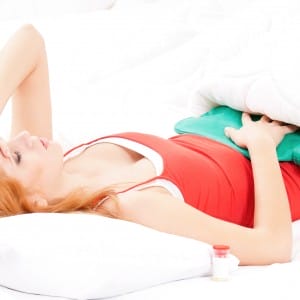
Premenstrual Syndrome (PMS) and PMDD (Premenstrual Dysphoric Disorder)
You live with PMS symptoms because you are a strong, stoic woman, but did you know that PMS does not have to be a fact of life every month? Premenstrual syndrome (PMS), affects 75 – 90% of women at some point, making it very common, but it is certainly not a sign of good health and hormonal balance. PMS is defined as a collection of symptoms that typically occur for one to two weeks before your period, followed by improvement for 2-3 weeks.
Premenstrual syndrome symptoms may include the following:
- Acne
- Anxiety
- Backaches
- Bloated abdomen
- Breast pain
- Constipation
- Cramping
- Cry easily or crying spells
- Depression
- Difficulty concentrating
- Difficulty sleeping
- Emotional hypersensitivity
- Excessive hunger or overeating
- Feeling depressed, irritable or anxious
- Food cravings for things like sweets, salty or chocolate
- Forgetfulness
- Headaches or migraines
- Irritability
- Low energy
- Joint pains
- Low libido
- Mood swings
- Tender, swollen breasts
- Suicidal thoughts
- Water retention
- Weight gain
- Withdrawal
Hormone Testing for PMS and PMDD
The following blood tests may help reveal why you have PMS or PMDD symptoms:
- Day 3 of your period: LH, FSH, estradiol
- 7 days after ovulation: progesterone
- Any day of your cycle: DHEAs, total testosterone, DHT, 8-9 a.m. cortisol, vitamin D
In addition to these, there may be other tests that are appropriate to your specific situation. Basal Body Temperature Charting, one-time DUTCH testing or DUTCH Cycle Mapping may provide a more complete hormonal picture. OAT testing may provide information about neurotransmitter balance.
Naturopathic Treatment of Premenstrual Syndrome (PMS)
Address the root cause of the problem; don’t settle for just easing the symptoms. PMS is caused by nutrient deficiencies, blood sugar instability, hormonal imbalances, and/or hormone fluctuations throughout a woman’s menstrual cycle.
7 Best Natural Remedies for PMS
- Avoid plastics, pollutants and animal fats because they contain hormones or hormone-like chemicals:
- Eat lots of organic fruit and vegetables
- Eat organic meats and dairy products (if desired)
- Store food and drinks in glass containers, not plastic
- Avoid petroleum-based personal care products like baby oil, foundation, and lipstick
- B vitamins help your liver to metabolize estrogen, they support your adrenals and HPA axis (your stress glands) and help you make serotonin, your mood-elevating neurotransmitter.
- Vitex, also known as Chastetree berry, has a progesterone-enhancing effect that helps with PMS. I do not recommend self-medicating with herbs; seek advice from a qualified naturopath.
- Improve your liver’s ability to detoxify and eliminate excess hormones and all toxins (not through the kits found at health food stores!). Cruciferous vegetables, leafy greens and select natural supplements provide support for phase I and phase II liver detoxification.
- Stabilize your blood sugar levels through exercise, healthy diet and supplements like chromium, vanadium and cinnamon.
- Magnesium relaxes muscle tension and supports healthy serotonin production. Serotonin is your mood-elevating neurotransmitter. It helps you to feel more upbeat.
- Fish oil and evening primrose oil balance prostaglandin production. Prostaglandins have an inflammatory or anti-inflammatory effect. The key is to achieve a healthy balance of essential fatty acids.
These are just a few of the many means that I use as a naturopath to balance hormones and ensure month-long health and happiness. Book an appointment here or call the clinic for more information at 416-481-0222.
Not ready to book an appointment yet? You may find this ebook helpful if your PMS is associated with anxiety:
PMS & Natural Treatment Research
Curcumin:
Khayat S, Fanaei H, Kheirkhan M, Moghadam Z, Kasaeian A, Javadimehr M. Curcumin attenuates the severity of premenstrual syndrome symptoms: a randomized, double-blind, placebo-controlled trial. Complement Ther Med. 2015: 23(3):318-24.
Aerobic Exercise:
Samadi Z, Taghian F, Valiani M. The effects of 8 weeks of regular aerobic exercise on the symptoms of premenstrual syndrome in non-athlete girls. Iran J Nurs Midwifery Res. 2013; 18(1):14-9.
● After 8 weeks of aerobic training (three 60-min sessions per week), mean scores of PMS and symptoms declined significantly
Vitex agnus castus:
Vitex agnus castus extract in women with premenstrual syndrome was found to decrease symptom severity.
Source: Phytomedicine. 2012 Nov 15;19(14):1325-31. Epub 2012 Sep 28.
Vitex agnus castus extract was found to be an effective and well-tolerated treatment for the relief of mild to moderate PMS symptoms.
Source: Acta Med Iran. 2012;50(2):101-6.
In 7/8 trials with premenstrual syndrome patients, Vitex extracts were found to be superior to placebo, pyridoxine, and magnesium oxide at dealing with the symptoms.
Source: Planta Med. 2012 Nov 7.
In a systematic review, V. angus castus (common name: chastetree), was proven to be a safe and effective treatment for PMS and premenstrual dysphoric disorder (#PMDD).
Source: Vitex agnus castus for premenstrual syndrome and premenstrual dysphoric disorder: a systematic review. Arch Womens Ment Health. 2017 Dec;20(6):713-719.
Evening Primrose Oil:
Current evidence suggests that oral evening primrose oil is likely ineffective for the treatment of premenstrual syndrome.
Source: American Family Physician, Volume 80, Issue 12, pages 1405-1408, December 2009.
Magnesium:
A study found that supplementation with magnesium and vitamin B6 led to the greatest decrease in PMS symptoms.
Source: Iranian Journal of Nursing and Midwifery Research, Volume 15, Issue 1, pages 401-405, December 2010.
Omega-3s:
Taking a daily omega-3 supplement led to a reduction in PMS symptoms including decreased severity and duration of depression, anxiety, lack of concentration and bloating.
Source: Complementary Therapies in Medicine Jan 2013 (In press).
Supplementation with omega-3 fatty acids was found to decrease the severity of depression, anxiety, lack of concentration and bloating in individuals with PMS. Source: Complement Ther Med. 2013 Jun;21(3):141-6
Zinc:
Low dietary intake of zinc has been identified as a possible risk factor for the development of PMS.
Source: Am. J. Epidemiol. (2013) doi: 10.1093/aje/kws363
Iron:
Low dietary intake of iron has been identified as a possible risk factor for the development of PMS.
Source: Am. J. Epidemiol. (2013) doi: 10.1093/aje/kws363
Chamomile:
Supplementation with chamomile extract was found to be more effective at reducing the intensity of emotional symptoms of premenstrual syndrome than mefenamic acid. Source: Complementary Therapies in Clinical Practice October 2013
Dr. Pamela has practiced as a naturopathic doctor in Toronto since 1999. She has received numerous “Best Naturopath in Toronto” awards. She is registered with the College of Naturopaths of Ontario.
Dr. Pamela Frank uses a natural treatment approach that may include acupuncture, herbal medicine, nutrition, diet, vitamins, supplements, and other natural remedies to restore balance and provide long-term resolution to almost any health problem.
DISCLAIMER: The information provided here may not apply precisely to your individual situation. Diagnostic and therapeutic choices must always be tailored to the individual patient’s circumstances, and consultation with a licensed naturopathic physician should be undertaken before following any of the treatment strategies suggested in this web site.
